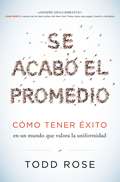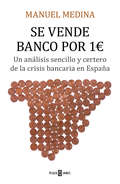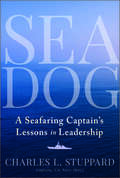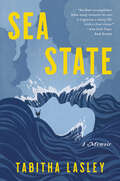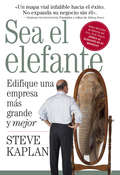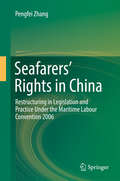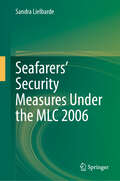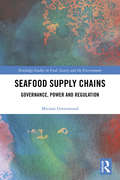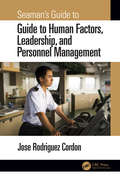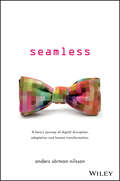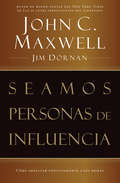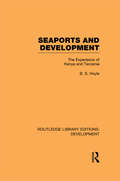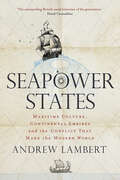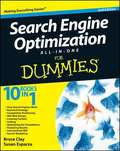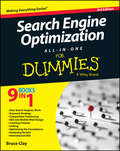- Table View
- List View
Se acabó el promedio: Cómo tener exito en un mundo que valora
by Todd Rose¿Estás por encima del promedio? ¿Es tu hijo un estudiante de primer nivel? ¿Es tu empleado una persona introvertida o extrovertida? Todos los días se nos mide con la vara de los promedios; se nos juzga por lo cercanos o lejanos que estamos a ella. La suposición de que una medida que nos compara con el promedio, como los escalones en el desarrollo, las pruebas de personalidad, los resultados estandarizados de exámenes y las evaluaciones de desempeño, revela algo significativo en cuanto a nuestro potencial se encuentra tan grabado en nuestra conciencia, que pocas veces lo cuestionamos. Todd Rose nos dice que esa suposición es espectacular y científicamente, errónea. En este libro, Rose demuestra que nadie es promedio. Pero aunque sabemos que los seres humanos aprendemos y nos desarrollamos de maneras distintas, estos patrones exclusivos de conducta se pierden en nuestras escuelas y empresas, que han sido diseñadas alrededor de esa mítica «persona promedio». Durante más de un siglo, este modelo ha pasado por alto nuestra individualidad y ha sido incapaz de reconocer el talento. Ha llegado la hora de cambiar esa situación. Combinando la ciencia y la historia con sus propias experiencias, Rose trae a la vida la historia sin narrar de cómo llegamos a aceptar la idea científicamente equivocada de que se pueden usar los promedios para entender a las personas, y ofrece una poderosa alternativa: los tres principios de individualidad. El principio de la irregularidad (el talento nunca es unidimensional), el principio del contexto (los rasgos son un mito) y el principio de las sendas (todos andamos por el camino menos recorrido) nos ayudan a comprender nuestra verdadera exclusividad, y la de los demás, y cómo aprovechar al máximo nuestra individualidad para tener una ventaja en la vida.
Se vende banco por un euro: Un análisis sencillo y certero de la crisis bancaria que asola España
by Manuel Medina¿Puede comprarse un banco, con un valor de miles de millones, por un euro? ¿Qué provocó realmente la caída de Bankia? ¿Cuáles fueron los verdaderos motivos de la «fuga» de los bancos catalanes en octubre de 2017? «Los casos sonados de corrupción donde las cajas de ahorros han tenido tanto protagonismo han hecho que el ciudadano medio no entienda nada de lo que pasa y desconfíe de todo.» El prestigioso abogado Manuel Medina, testigo privilegiado de los hechos, nos ofrece en este libro una reflexión de la crisis desde un punto de vista optimista y nos invita a recapacitar sobre el tiempo que transcurre durante ella. El autor desgrana los distintos tipos de crisis: la de valores, acuciada por la falta de afectos; la de la familia, urgida por la vida urbana, las prisas y la frialdad de las comunicaciones; la de identidad, conocida como las tres Des: el desempleo, la desesperación y el desengaño; la política, producto de la corrupción; la social, que ha causado gran pobreza y desigualdad; la bancaria y, por último, la crisis económica. «Las crisis pasan, pero lo que que se sufre con ellas no se olvida y, a pesar de la situación económica, la vida no espera.» Se vende banco por 1# es un libro imprescindible para entender la génesis, la actualidad y el futuro de la situación económica de nuestro país.
Sea Dog: A Seafaring Captain's Lessons in Leadership
by Charles L. StuppardYour guide to becoming a worthy leader, based on true stories from a fulfilling military career From the high seas to high commands in Iraq, Kuwait, and Afghanistan, Sea Dog: An Old Salt's Lessons in Leadership tells the tale of Charles L. Stuppard and his journey from growing up surrounded by poverty and violence to becoming a Navy Captain in charge of the US Navy's most technologically sophisticated warship. In this book, Stuppard details exactly how he managed to not only become a great leader, but one who acts with character, empathy, and honor, not because of inherent advantages in his life, but rather through learning and applying hard lessons at every point in his fulfilling career. Drawing on captivating stories from intense special training and beyond, this book covers key leadership concepts such as: Learning to focus on the right things so that the rest of your team will follow your lead Defining your success as a leader by what people say about you after you leave your organization Using your power to encourage empathy and generosity in yourself and others Captivating, inspiring, and practical, Sea Dog: An Old Salt's Lessons in Leadership is an essential read for aspiring and current leaders across organizations and industries who seek to lead with confidence, charisma, and compassion.
Sea State: A Memoir
by Tabitha LasleyA Recommended Read from: Vogue * The Los Angeles Times * Publishers Weekly * The Week * Lit HubA stunning and brutally honest memoir that shines a light on what happens when female desire conflicts with a culture of masculinity in crisisIn her midthirties and newly free from a terrible relationship, Tabitha Lasley quit her job at a London magazine, packed her bags, and poured her savings into a six-month lease on an apartment in Aberdeen, Scotland. She decided to make good on a long-deferred idea for a book about oil rigs and the men who work on them. Why oil rigs? She wanted to see what men were like with no women around.In Aberdeen, Tabitha became deeply entrenched in the world of roughnecks, a teeming subculture rich with brawls, hard labor, and competition. The longer she stayed, the more she found her presence had a destabilizing effect on the men—and her.Sea State is on the one hand a portrait of an overlooked industry: “offshore” is a way of life for generations of primarily working-class men and also a potent metaphor for those parts of life we keep at bay—class, masculinity, the transactions of desire, and the awful slipperiness of a ladder that could, if we tried hard enough, lead us to security.Sea State is on the other hand the story of a journalist whose professional distance from her subject becomes perilously thin. In Aberdeen, Tabitha gets high and dances with abandon, reliving her youth, when the music was good and the boys were bad. Twenty years on, there is Caden: a married rig worker who spends three weeks on and three weeks off. Alone and in an increasingly precarious state, Tabitha dives into their growing attraction. The relationship, reckless and explosive, will lay them both bare.
Sea el elefante: Edifique una empresa más grande y mejor
by Steve KaplanUn mapa vial infalible hacia el éxito. ¡No expanda su negocio sin él!Usteddirige un negocio de asesoría de $5 millones de dólares, o unapanadería de tres personas con unas cuantas compañías como clientes, ouna nueva empresa de la Internet que está por entrar a su segundo año.Usted es un miembro principal de una firma de abogados, o una hijaasumiendo el control de la fábrica que le pertenece a la familia. Ustedes un vendedor profesional tratando de aumentar sus comisiones.Sabe que su negocio está viviendo con las justas. No tiene muchaflexibilidad o capital de reserva, y tiene que hacer estirar lasganancias. Y aunque está contento de no tener los tremendos dolores decabeza de una corporación gigante (a pesar de desear tener el ingresogigante), está preocupado por el Síndrome del Negocio que se Encoge. Noobstante, pensar en el crecimiento lo pone nervioso. Bienvenido a estelibro. Con Sea el elefante su camino a volverse más grande y mejor se acaba de poner mucho más claro.
Seafarers’ Rights in China
by Pengfei ZhangThis book critically investigates the conditions of seafarers rights in China in legislation and in practice, focusing in particular on the restructuring process following the 2006 Maritime Labour Convention. Accordingly, it poses key research questions to major Chinese stakeholders to gauge their responses to the Convention, to determine whether the protection of Chinese seafarers has actually improved since the advent of the Convention, and further, to identify the continuing challenges for future improvement. The Convention will enter into force in China in November 2016, bringing with it significant changes. "
Seafarers’ Security Measures Under the MLC 2006
by Sandra LielbardeThe book is intended to be about the Maritime Labour Convention 2006 (MLC 2006), about seafarers' security measures available before MLC 2006 and after its adoption. The following security measures will be addressed in the book: mandatory financial security established by the MLC 2006, flag State responsibility, labour supplying responsibility, port State control, and a ship arrest. The responsibility of the shipowner in respect of the seafarers engaged in work on his ship will be discussed in analysis of nowadays seafarers' recruitment process and a legal structure of shipping companies. Content will include the analysis of international (UNCLOS, ILO and IMO conventions, UNCCRO's, and Vienna Convention on Consular Relations 1963) and national law (Denmark, Estonia, Finland, Germany, Latvia, Norway, The Philippines, and The UK), and relevant legal documents - agreements, guidelines, and court cases. Under the MLC 2006 the shipowner has an obligation to ensure appropriate working conditions on board a ship, due payment of wages, repatriation of seafarers and to fulfil other obligations in accordance with international and national law and the seafarer’s employment agreement. Even nowadays, there are still shipowners who do not take care of the people who work on their ships: the crew onboard is left without food and drinking water, has not been paid for their work and cannot go back home because the shipowner does not pay for their repatriation. Current COVID-19 pandemic turned out to be a serious challenge to the MLC 2006 operation in practice. The MLC issues and seafarers’ employment and social rights continue to be on the agenda of shipping industry. It is expected that on 24 December 2024 the amendments of 2022 to the Code of the MLC 2006 will come into force. The Guidelines for port State and flag State authorities on how to deal with seafarer abandonment cases were adopted on First Meeting of the Joint ILO–IMO Tripartite Working Group to identify and address seafarers’ issues and the human element, held on 13–15 December 2022. The book aims to promote uniformity in implementation of the MLC 2006 by this increasing effectiveness of the MLC 2006. Book will bring a new knowledge in the area of maritime labour law. Accordingly, the author hopes that the book will be an important contribution for promoting understanding of seafarers’ rights and shipowners’ responsibilities under the MLC. It is intended that the book will be interesting for the professionals, seafarers, and also for students in Law/shipping faculties.
Seafood Processing By-Products
by Se-Kwon KimThe seafood processing industry produces a large amount of by-products that usually consist of bioactive materials such as proteins, enzymes, fatty acids, and biopolymers. These by-products are often underutilized or wasted, even though they have been shown to have biotechnological, nutritional, pharmaceutical, and biomedical applications. For example, by-products derived from crustaceans and algae have been successfully applied in place of collagen and gelatin in food, cosmetics, drug delivery, and tissue engineering. Divided into four parts and consisting of twenty-seven chapters, this book discusses seafood by-product development, isolation, and characterization, and demonstrates the importance of seafood by-products for the pharmaceutical, nutraceutical, and biomedical industries.
Seafood Supply Chains: Governance, Power and Regulation (Routledge Studies in Food, Society and the Environment)
by Miriam GreenwoodThis book provides a historical and analytical account of changes in the seafood supply chain in Britain from the mid-twentieth century to the present, looking at the impact of various types of governance. The governance of marine fisheries has been a contested issue for decades with increasing anxieties about overfishing. In tandem, the rise of aquaculture, fish and shellfish farming, has driven another set of environmental concerns. In the food system, there have been scandals about safety failures and about fraud. At the same time, governments issue advice urging people to eat fish for its health benefits. In the context of these problems and contradictions, how have governments, the food industry and ordinary consumers responded? The author shows how different types of governance and regulation have been used to seek seafood sustainability and food safety and to communicate nutritional messages to the public and with what effects. The book also presents a new model for understanding food chains which combines governance and power approaches with an emphasis on understanding the interests served and the resulting balance of public and private benefits. This shows that the role of state regulation should have greater emphasis in governance and agri-food analysis and that theories about supply chain functioning, including the part played by major retailers and civil society, should be modified by a more nuanced understanding of the role of standards and certification systems. Although much of the focus is on the UK and Europe, this book provides key lessons internationally for the governance of seafood and other agri-food supply chains. The book will be of interest to students of food policy and those working in the seafood industry or studying for connected qualifications, and more widely to readers with an interest in seafood issues and problems.
Seagate Technology Buyout
by Stuart C. Gilson Todd Pulvino Gregor AndradeIn March 2000, a group of private investors and senior managers were negotiating a deal to acquire the disk drive operations of Seagate Technology. The motivating factor for the buyout was the apparently anomalous market value of Seagate's equity: Seagate's equity value was just a fraction of the value of its minority stake in Veritas Software Corp., a software maker. The investor group had to decide how much to offer for the operating assets, as well as how to finance the transaction. Further complicating the analysis was the fact that, unlike in traditional buyout settings, the target company was in a highly cyclical, volatile, and capital--intensive industry.
Sealed Air Corp.
by Robert J. DolanMarket leadership and technological innovation have marked Sealed Air's participation in the U.S. protective packaging market. Several small regional producers have introduced products which are less effective than Sealed Air's but similar in appearance and cheaper. The company must determine its response to this new competition. Feasible options range from doing nothing to introducing a new product. Raises product line management issues, particularly cannibalization, and affords the opportunity for the development of a marketing plan for any new product introduction. Software for this case is available (9-587-513).
Sealed Air Corp.'s Leveraged Recapitalization (B)
by Brian Barry Karen H. WruckSupplements the (A) case.
Sealed Air Corp.: Globalization and Corporate Culture (A) (Abridged)
by Lynn Sharp Paine Karen H. WruckSealed Air Corp.'s CEO and COO are considering what approach they should take to building a seamless corporate culture worldwide. Anticipating continuing growth and expansion, especially outside the United States, they are concerned with preserving and promoting the culture that has been one of the company's key assets. However, their experience in integrating acquired companies, especially outside the United States, has heightened their awareness of differences among the regional cultures of the world and the challenges they face in maintaining a unified corporate culture.
Sealed Air Corp.: Globalization and Corporate Culture (A) (Abridged)
by Lynn Sharp Paine Karen H. WruckSealed Air Corp.'s CEO and COO are considering what approach they should take to building a seamless corporate culture worldwide. Anticipating continuing growth and expansion, especially outside the United States, they are concerned with preserving and promoting the culture that has been one of the company's key assets. However, their experience in integrating acquired companies, especially outside the United States, has heightened their awareness of differences among the regional cultures of the world and the challenges they face in maintaining a unified corporate culture.
Sealed Air Corporation: Deciding the Fate of VTID
by Elie OfekIn mid 2010 the Sealed Air Corporation has to decide on next steps for its novel video tracking technology (called VTID) after unsuccessful attempts to market it in three different industry settings. The company must determine whether its most recent target market, the quick-serve restaurant segment, is still worth pursuing or whether the company should look for a different application and market altogether. The company could also revisit the previous two applications, tracking and tracing processed meat and tracking employee safety practices. At the other extreme, after seven years of R&D and marketing efforts and millions of dollars in expenses, the company could cease attempts to commercialize VTID.
Sealed Air Corps Leveraged Recapitalization (A)
by Brian Barry Karen H. WruckLess than a year after Sealed Air embarked on a program to improve manufacturing efficiency and product quality, the company borrowed almost 90% of the market value of its common stock and paid it out as a special dividend to shareholders. Management purposefully and successfully used the leveraged recapitalization as a watershed event, creating a crisis that disrupted the status quo and promoted internal change, which included establishing a new objective, changing compensation systems, and reorganizing manufacturing and capital budgeting processes.
Sealed Air Taiwan (A)
by Lynn Sharp Paine Robert J. CrawfordThe general manager for U.S.-based Sealed Air Corp.'s Taiwan subsidiary must decide whether he's hired the right person to bridge the gap between Sealed Air's corporate culture and Taiwan's business culture. This case details Bob Kayser's experiences in trying to infuse the Sealed Air culture into the Taiwan operation, including approaches to training, compensation, and motivation.
Sealed Air Taiwan (A) (Abridged)
by Lynn Sharp PaineThe general manager for U.S.-based Sealed Air Corp.'s Taiwan subsidiary must decide how to improve productivity and achieve profitability. In addition to considering a new approach to compensation, he is wondering how to bridge the gap between Sealed Air's corporate culture and local business practices in Taiwan. A particular problematic practice is the local use of "tea money."
Seaman's Guide to Human Factors, Leadership, and Personnel Management
by Jose Rodriguez CordonTraining and certification for Seafarers has been founded on technical aspects, but maybe the most important thing to do aboard a ship is dealing with people. This book, written with seamen in mind, covers areas of expertise that every officer should know to improve motivation, engagement, teamwork, and conflict handling; in short, to be a leader. This book also covers the new requirements for every officer or merchant marine and can be used in courses on this topic. It focuses on seafarers' needs and the language used, avoiding the excessive use of psychological terms, yet keeping the accuracy. Features Covers new requirements for every Merchant Marine Officer Written for and by a seaman, with the accuracy of a psychologist Presents knowledge on how to improve motivation, engagement, teamwork, and conflict handling Includes how to manage people in emergency situations and avoid the loss of lives, like the disaster of Costa Concordia and Estonia
Seamless: A Hero's Journey of Digital Disruption, Adaptation and Human Transformation
by Anders Sorman-NilssonAchieve brand success with smarter change management and seamless transformation Seamless is a guide for transforming your brand and heroically taking your business into the future. Customers are sick and tired of the inconvenience, friction, arrogance and grating seams they experience on their customer journeys caused by brands undergoing awkward and haphazard change. This book shows you how to remove the external and internal seams for a smooth transition between marketing channels, to provide a transformative customer journey. Anders Sörman-Nilsson, futurist and author of Digilogue (Wiley 2013), reveals the key factors to designing a cohesive and agile brand that is fit for the future. This book looks at on-the-ground implementation of Digilogue ideas, giving you a first-hand account of how emerging technology has evolved and disrupted the business landscape since 2013. You'll learn the trials and tribulations of omnichannel marketing, change leadership, start up thinking versus a heritage (and family) business legacy and why there has never been a better time to implement seamless technologies in your business. The future doesn't unfold neatly — in fact, it's often a disruptive slap in the face. Seamless is the key to a successful business future, and this book shows you how to make seamlessness work for your company, starting today. Design away the friction with transformative customer experiences Weave disparate channels and parts of a brand together into a seamless whole Take an integrative, rather than additive, approach to communications Achieve the highest level of customer intimacy, the key to customer loyalty Drive seamless change inside your organisation by designing journeys of constant adaptation Communication channels continue to proliferate, and simply adding every new flash in the pan is a sure path to ruin. You need to bring together every part of your brand into a cohesive whole, one with deliberate, strategic structure and wholeheartedly gather all your stakeholders around it. Seamless shows you how to remove the scar tissue, reveal your brand's fresh edge and meet the future curious, agile and open-minded.
Seamos personas de influencia
by John C. MaxwellCon influencia, usted puede lograr el éxito en el hogar, el trabajo, y en toda área de la vida.Cualquiera que sea su vocación o aspiración, usted puede aumentar el impacto que tiene sobre los demás al convertirse en una persona de influencia. Ya sea que desse crear un negocio, fortalecer a sus hijos, o alcanzar al mundo, usted puede lograrlo elevando su nivel de influencia en la vida de los demás.
Seaports and Development: The Experience of Kenya and Tanzania (Routledge Library Editions: Development #69)
by B. S. HoyleThis book, originally published in 1983, demonstrates the importance of seaports in the growth of less-developed countries. The author focuses on the character of port activity within the context of transport systems and regional economic planning. General principles of port development are illustrated by detailed reference to one Third World port group, that of the Indian Ocean coasts of Kenya and Tanzania. The objective is not merely to illustrate the character of one specific group of ports, but to demonstrate methods of analysis and to underline the crucial role of ports in the development process.
Seapower States: Maritime Culture, Continental Empires and the Conflict That Made the Modern World
by Andrew Lambert“A fascinating geopolitical chronicle . . . A superb survey of the perennial opportunities and risks in what Herman Melville called ‘the watery part of the world.’” —The Wall Street JournalIn this volume, one of the most eminent historians of our age investigates the extraordinary success of five small maritime states. Andrew Lambert, author of The Challenge: Britain Against America in the Naval War of 1812—winner of the prestigious Anderson Medal—turns his attention to Athens, Carthage, Venice, the Dutch Republic, and Britain, examining how their identities as “seapowers” informed their actions and enabled them to achieve success disproportionate to their size.Lambert demonstrates how creating maritime identities made these states more dynamic, open, and inclusive than their lumbering continental rivals. Only when they forgot this aspect of their identity did these nations begin to decline. Recognizing that the United States and China are modern naval powers—rather than seapowers—is essential to understanding current affairs, as well as the long-term trends in world history. This volume is a highly original “big think” analysis of five states whose success—and eventual failure—is a subject of enduring interest, by a scholar at the top of his game.“An intriguing series of stories of communities thinking seriously about how to stand their own ground when outpowered, how to do so in ways that are consistent with their values, and sometimes how to negotiate the descent from being a great power when the cards just aren’t in their favor any more. These are timely questions.” —Times Higher Education Supplement“Lambert is, without a doubt, the most insightful naval historian writing today.” —The Times
Search Engine Optimization All-in-One For Dummies
by Bruce Clay Susan EsparzaTen minibooks cover all you need to know about search engine optimization Search engine optimization (SEO) is an essential tool for getting a handle on web site promotional tactics and tools. With this complete reference, you'll explore issues not covered anywhere else, including international SEO, how to optimize servers for SEO, and much more. Ten separate books join forces to provide you with a comprehensive, straightforward guide to the benefits, details, and tricks of SEO. Coverage devotes time to topics such as keyword strategy, competitive positioning, SEO web design, search marketing, and more. You'll also look at how search engines work and how to create content, link, optimize the foundations, and analyze results. Details the capabilities and benefits of search engine optimization (SEO) for gauging the success of online promotional tactics and tools Explains how search engines work, nuances of keyword strategy, how to deal with competitive positioning, and more Walks you through working with SEO web design, creating content, linking, optimizing the foundations, and analyzing results Touches on topics not covered anywhere else, including international SEO and optimizing servers for SEO Search no further! This book is one-stop shopping for everything you need in order to start your engine and embrace the potential of SEO today.
Search Engine Optimization All-in-One For Dummies
by Bruce ClayThe most comprehensive coverage of search engine optimization In Search Engine Optimization All-in-One For Dummies, 3rd Edition, Bruce Clay--whose search engine consultancy predates Google--shares everything you need to know about SEO. In minibooks that cover the entire topic, you'll discover how search engines work, how to apply effective keyword strategies, ways to use SEO to position yourself competitively, the latest on international SEO practices, and more. If SEO makes your head spin, this no-nonsense guide makes it easier. You'll get the lowdown on how to use search engine optimization to improve the quality and volume of traffic on your website via search engine results. Cutting through technical jargon, it gets you up to speed quickly on how to use SEO to get your website in the top of the rankings, target different kinds of searches, and win more industry-specific vertical search engine results! Includes new and updated material, featuring the latest on Bing!, Google instant search, image search, and much more Covers SEO and optimizing servers for SEO Provides important information on SEO web design Shows you how to use SEO to stay "above the fold" If you're a website owner, developer, marketer, or SEO consultant, Search Engine Optimization All-in-One For Dummies, Third Edition is the only resource you need to beat the competition.
